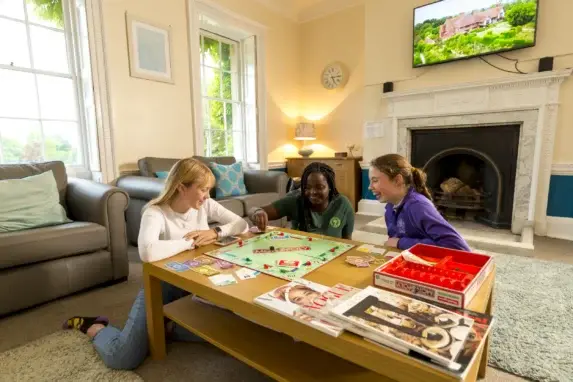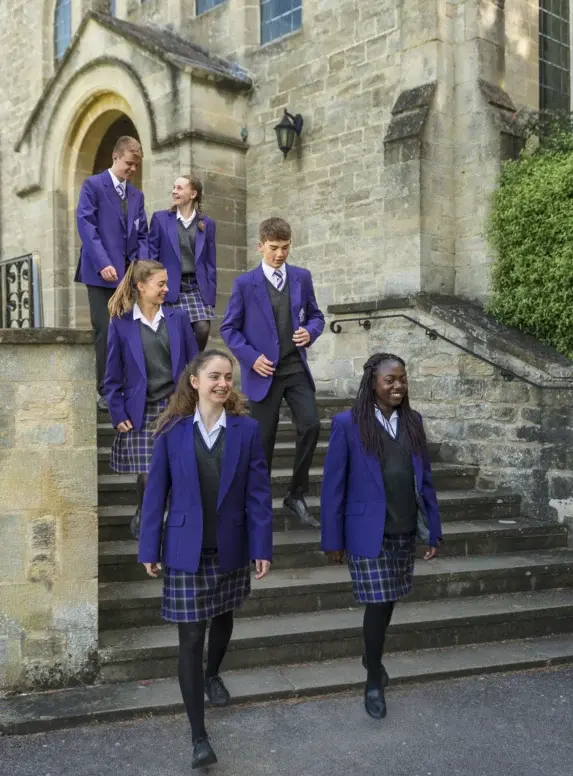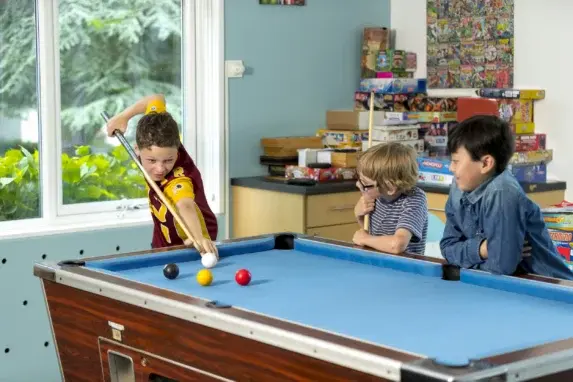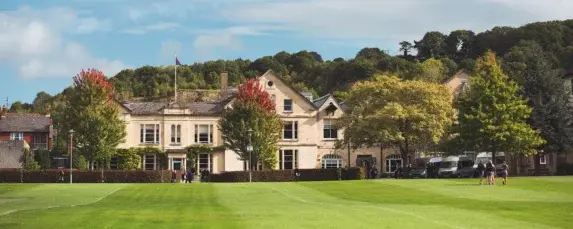- Admissions
- Nurseryages 3-4
- Prep Schoolages 4-13
- Senior Schoolages 13-18
- Boarding
- International
- Forces families
- About Us
- Contact Us
Different to a day school where pupils stay for the day to learn and then go home, a Boarding School is where students live and learn during the school year.
Boarding comes from the phrase ‘room and board’ which refers to lodging and dining so therefore Boarding School means to lodge, dine and be educated.
Pupils in Boarding School live in dorms and study on campus with their fellow pupils and are supported by their teachers and other staff in Pastoral Care teams with Housemistresses and Housemasters. Boarding School pupils are usually referred to as ‘Boarders.’
In the UK, there are two types of Boarding School: Single-Gender and Co-ed schools.
Single-Gender schools are schools for either only boys or only girls.
Co-ed schools are schools for mixed or both genders.
In a Co-ed school, while lessons are mixed with both boys and girls, genders live in separate dorms and Boarding Houses but will mix for weekend activities and social events. When weighing up what type of school would work best for your child, whether a school is Co-ed or Single-Gender shouldn’t be the only consideration as there are a wide range of factors to think about.

Every family and child have different needs and what works for one family may not work for another. For this reason, Boarding Schools generally offer a range of boarding options to meet those various needs. This will vary between schools so as it will be an important factor when choosing a school, it’s always worth checking directly with the school as to what they can provide.
While not ‘boarding’ per-se, day pupils can still benefit from receiving a quality, boarding education without actually having to stay overnight. Each pupil has their own space with a desk, shelves and cupboard so they can work at school and keep their belongings in their own area. With Day Boarding the pupil stays late after school, for homework (prep) or a late activity and then sometimes joining to have supper with the boarders. They go home at the end of the evening.
With demanding careers or with parents working outside the traditional 9-5 hours, Wraparound Care for day pupils is very often offered at boarding schools. This is where day pupils can come in before school hours and stay late before being picked up by parents or Guardians.
The most common boarding option. Boarders stay and live on campus 24 hours a day, 7 days a week. Full Boarders have the full boarding experience; fully integrated into campus community, dining, living and taking part in daily and weekend activities with other boarders. Full boarders go home to their families or guardians during holiday periods, such as half term and at the end of term.
With full Boarding, there is a weekend at home every half term, called an Exeat weekend. This is when pupils can go and see their families at home or stay with their Guardian. Some boarding schools (such as Wycliffe) remain open over the Exeat weekend so that pupils can remain on campus – this is particularly useful for international pupils.
For international pupils, where going home to their resident country may not be an option; they can stay with their UK Guardian.
Where full boarding is not needed, there may still be a requirement for some boarding if parents work away at weekends or during the week for example. This is where flexible boarding can help. Flexi-boarding isn’t offered at every school but can work well for families where a commitment to full boarding isn’t needed. Families can choose how many nights they would like to use Flexi-boarding and this is usually booked in advance.
For even more flexibility, occasional boarding may be offered. Occasional boarding is ad-hoc and may only involve staying in a House just once every term for example.

Whether you’re an international pupil or live in the UK, there are many reasons why boarding school could be right for your family. There could be practical and emotional reasons to attend boarding schools.
For Forces Families, parents may be deployed and move around often and therefore boarding provides stability and security for children.
Other families where parents and guardians may have to frequently move around or be away from home may mean your child could benefit from boarding school too. Juggling the demands of work can be challenging and while it may seem daunting to send your child to boarding school, these days parents can still take an active role in their child’s education even from far away. This ensures that parents stay connected and communicate with their child.
On an emotional level, your child may not be developing or accessing the education they deserve and therefore an independent education at a boarding school could be the right path forward compared to a traditional state school route.
Boarding schools offer something for every pupil and a range of choice when it comes to subjects and extra-curricular activities too. This allows pupils to develop academically, spiritually and creatively enriching the child as a whole – not just from the academic perspective. The learning experience at boarding schools is very often cited as one of the main reasons to attend boarding school. Every school is different though and the blend of approaches can vary distinctively.
Boarding schools often have small class sizes meaning access to 1-2-1 learning or small group learning. Teachers can offer extra support to pupils who have learning challenges, and this is especially attractive for international pupils. Where English may not be the first language, pupils can benefit from additional support through assigned teaching assistants and dedicated English language teaching and EAL examination programmes.
Access to superior facilities such as swimming pools, tennis courts and state of the art theatres can be a major reason to attend boarding school. Facilities help children to thrive and develop outside the classroom and if your child has a particular passion or talent in a particular field, a boarding school which offers specialism in this area may be a good route for your child.
Qualifications in the UK are widely respected globally and gaining such qualifications such as GCSEs, A-Levels or the International Baccalaureate can open up opportunities to attend UK universities and, have a positive impact on future career prospects. It is reported that results tend to be higher than the national average when studying at a UK boarding school. In 2019, 46% of A-Level students received an A* or A grade; 20% higher than the national average of 26%.
Being immersed in the UK culture and being part of a diverse community is one of the main drivers of attending boarding school here. Many boarding schools are set in beautiful campus settings with access to quality facilities and accommodation as standard in addition to learning the English language in the process. For international pupils, this can be particularly appealing as this has the potential to open up more career opportunities later in life both in the UK and in other countries.
Boarding schools are the perfect solution for Forces Families; providing a home away from home for children whose parents may be stationed in different locations across the UK or globally. For children, moving around too much can have a negative impact on their development and education which is why choosing to send them to a boarding school can be a really positive decision. While you may have to move around frequently, you can be safe in the knowledge that your child is safe, secure and cared for.
Boarding school can be an affordable choice for Forces Families as they can benefit by only having to pay 10% of fees through the Continuity of Education Allowance (CEA) Scheme available through certain recognised schools.

Be aware that boarding school may not be right for every individual child and you should weigh up both positives and negatives when deciding on schooling options. While boarding school provides a unique education where many children can thrive, it may not suit your child’s personality or your family life. Some consequences of boarding school may include:
It’s worthwhile mentioning that it’s not a one size fits all approach and every boarding school in the UK has its own approach with similarities and differences. While one boarding school may work for your child, it may not work for another child or even siblings.
Boarding may not be suitable for every family and other schooling options could include:
• Home-schooling
• Admission to the state school system
• Online schooling
Life at boarding school can be diverse and rich with a vast range of activities and a perfect blend of community and place on offer. Boarding schools are often set in wide acres of space in either countryside or city settings.
Houses are split between boys and girls however the facilities within each House will largely be the same although there will be differences between schools. Houses at boarding schools will feature dorms and other rooms such as common rooms, kitchen areas and games rooms – perfect for socialising and keeping busy when not studying! Children are kept safe as each Boarding House will have its own Housemaster or Housemistress that will live in the House (or nearby) and be on hand to support children whenever needed.
Wycliffe offer separate boarding houses for the Prep School and Secondary School.
Find out more about our Prep Boarding Houses and Senior School Boarding Houses.
Wycliffe’s boarding school dorms are spacious but homely and comfortable. In Years 3 to 6, pupils will share a dorm with three or four other children – but they will have their space with a bed, shelves, drawers and wardrobe. Many children of this age often describe it as a ‘massive sleepover’! In Years 7 and 8 there tends to be two or three in a room together, but again these dorms are spacious to give each pupils their own area. The bathrooms are also shared but there are plenty of showers to go round for the morning rush. From Years 9 to 11, the Boarders will share their dorm or bedroom with one other pupil, and the Houses usually have around 35 to 45 pupils in each one. For Sixth Form (Years 12 and 13) the pupils are in their own rooms – sometimes with an ensuite bathroom and sometimes with a shared bathroom (but never with that many pupils). There is a daily laundry service in every House, and the children are encouraged to personalise their boarding space with their own bed linen, posters and cushions (or cuddlies!).
As well as offering an element of free time, boarders will be given the opportunity to socialise and take part in activities in the evening and during weekends that children may not have considered trying before. From outdoor activities including hiking and bee-keeping to activities to support the well-being of children such as yoga and mindfulness, boarding schools generally offer something for everyone. Depending on where the school is located (countryside vs town or city) may also have an impact on the weekend activities available.
At Wycliffe, the range of activities is vast including themed weekends, cooking nights and Laser Tag.
Settling into life at boarding school can be challenging as it is a shift outside the normal routine, and it may mean getting used to being away from home for the first time.
To make the transition easier boarders will be supported by their Housemistress or Housemaster and will very often share a dorm – so you are never alone! If your child is particularly anxious, think about the reputation that the schools have for their Pastoral Care and how much additional support can be provided.
Encourage your child to get involved with any activities on offer so they can fully integrate within the community, socialise and get to know other children.
It’s important to remember that missing home is perfectly normal however being away from home is a chance to gain independence and experience what it’s like to be without parents all the time which can have a real positive impact on leaving home later in life.

Being away from your children is one of the biggest concerns you may have when considering placing your child into boarding school. Fortunately, it’s never been easier to stay connected and maintain a relationship with your children due to the power of the internet and mobile phones.
While using mobile phones is often not permitted inside the classroom, it is allowed outside the classroom so parents can easily stay in touch with children by text, call or email! Don’t forget to check the time difference before you call your relatives though – while it may be 7pm in the UK, it could be 4am somewhere else!
For boarders at Prep School age of 7-13, it may be the first time they experience boarding school. Prep school is where the foundations of learning are made and for this reason, choosing a school where your child will be well cared for and supported is essential for them to thrive properly.
Find out about boarding at Wycliffe Prep School.
Boarding from the age of 13-19 can give pupils a great opportunity to gain independence, foster thought and prepare themselves for the outside world of work or further education. Choosing the right school during these years will have a massive impact on later life and the ability to reach their full potential.
As pupils develop personal interests become more apparent; choosing the best Senior School that offers the right combination of extra-curricular activities, GCSE subjects and post-16 courses is important and therefore, you should take time to explore all your options.
At Wycliffe, pupils are well supported with seven boarding houses on offer in our Senior School – each one with their own personality and style. Find out more about our Senior School boarding houses.
You’ve decided boarding school is right for your family and your child. What are the next steps? You need to find a boarding school that is most suitable for your child and family life.
Some things to consider may include:
These are just some factors however it is important to get a well-rounded view on every school you are considering before you make a decision. To help you make a decision, you may want to shortlist a number of schools to weigh up the pros and cons of each one.
Asking the right questions when visiting a school is key to understanding whether the school is the best fit for your child and family. This is a big decision and making sure you get this right is critical to ensure your child is settled and happy. This will depend on what you need but some questions to ask may include:
If you cannot visit the school directly, talk to the Admissions Managers to see if a virtual tour or chat can be organised.
Sending your child to boarding school can be an expensive choice; but the investment in your child’s education can totally be worth it in the long run. Having said this, finances will play a big role in deciding whether to send your child to boarding school and you should understand all the costs and fees involved prior to applying.
Costs you have to consider include tuition fees, equipment, uniform and travel costs however it is worth talking to the school about all the fees involved before applying. Many schools offer payment on a term-by-term basis making it much more manageable for parents while some may offer payment schemes such as monthly direct debit plans.
In addition to this, check whether your school offers any incentives such as bursaries or scholarships that your child could benefit from.
Most UK boarding schools have some sort of application process before being accepted as a pupil. The application process can vary with schools having different requirements on entrance exams that need to be taken. The process may also involve some sort of interview. The application process may also be more detailed if you are looking to obtain a scholarship or bursary from the school.
Again, it is worth checking with the school you are applying for in regards to their application process as all schools can be different.
We explain how to apply for a place at Wycliffe here.
If you are coming to the UK outside of Europe, pupils will be required to have a valid student visa. This will usually be a Child Student visa for 4-17 year olds. It can take time to obtain the visa (anywhere between 4 and 12 weeks) so it’s worth starting this process early on when you know your child will be attending a UK boarding school. Wycliffe can offer advice on what is needed before you arrive. Contact our team.
It’s also worthwhile making a list of all the administrative requirements that need to be taken care of prior to your child arriving in the UK such as getting insurance cover and exchanging money to ensure you have everything covered. Your educational agent and school will be able to help you here.

It’s completely normal for children to be anxious about starting boarding school however you can reduce some anxieties by taking time to prepare properly. From getting organised, to talking to your children about how you can stay in touch to making sure you pack the right things, these are just a few ways you can ensure your child gets off to the best possible start.
Many past students who have attended boarding school have gone on to bigger and better things; and are highly recognised for their talents and achievements in different areas from acting to music to sports. Some names you may be familiar with who attended boarding school include:
We are often asked how Wycliffe’s boarding school compares to the most famous boarding school out there… Hogwarts. Although, we could be bias and say that our school far outshines the books; our pupils think so too.
Take a look for yourself at what has been said about the similari
For more information on boarding in the UK, you can get in touch with the Wycliffe team who will be happy to answer any questions you may have on everything from fees to the application process to the houses.
The Good Schools Guide also provides a wealth of information on boarding for UK and international pupils.

Just a short drive from the Cotswolds, Wycliffe’s boarding school and houses are set in a picturesque countryside location. With good transport links to London, we offer co-ed boarding for children from the age of 7 through to 19 with quality, tailored care and support.
Find out about our boarding school and how it could suit your family life.
Related Articles